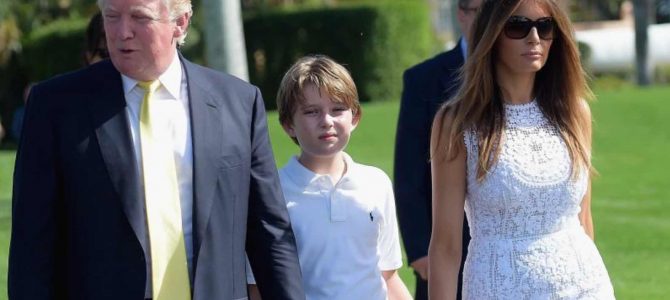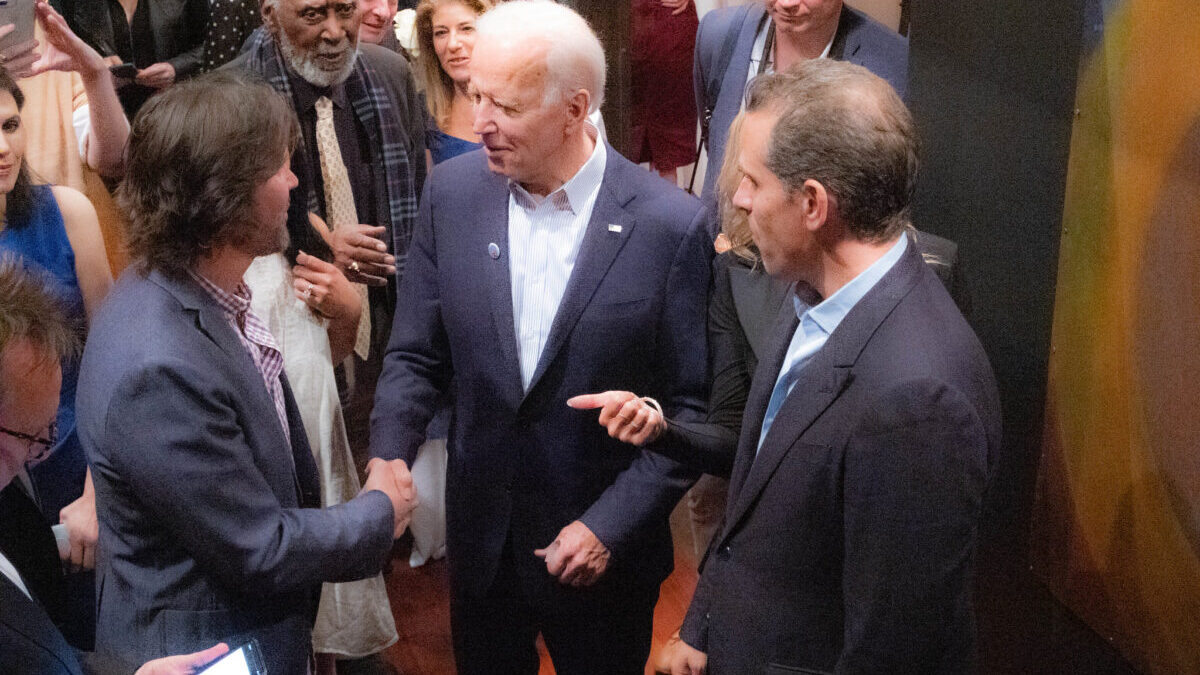
“It’s unfair what has happened to the people in our country, and we’re going to change it. Simple as that,” declared President-elect Donald Trump to Leslie Stahl of “60 Minutes” recently. As a mother of four kids and the author of the new book “No Child Left Alone: Getting the government out of parenting” (Encounter Books, 2016), I couldn’t agree more.
Parents across the nation have been treated unfairly by all levels of our government, too often for behavior that caused no harm to their children and about which authorities ought to have no opinion. I’d like nothing more than for a Trump presidency to usher in a new age of reduced government involvement in family life.
Here, then, are some top reasons Commander-in-Chief Trump may be good for parents.
1. He’s Not Helicopter Hillary
Every parent dodged a bullet when Hillary Clinton lost the election. After all, she is a self-declared overprotective (helicopter) parent and the author of the nanny state bible on why the government should “help” parents raise their children. What that actually means, as we’ve learned over the past 20 years since “It Takes a Village” was first published, is that those kind of words—help children, protect children, keep the kids safe—are code for “We know better than you how to raise children and we’re going to take away your rights in the process.”
Clinton comes by her desire for government to “help” parents and “invest” in children honestly, at least. In her book she admits how little individual incentive or independence she allowed her daughter Chelsea.
One warm spring afternoon when Chelsea was about nine years old, she and a friend, who had been riding their bikes around the fountain in front of the governor’s mansion, came inside to ask if they could bike to the public library ten blocks away. I remembered all the trips I’d made to my local library at their age, unaccompanied and unafraid. Tears welled up in my eyes as I told her no. I put aside what I was doing and drove the girls to the library instead. My reaction may have been disproportionate to the actual risk involved, but it was symptomatic of the general anxiety about children’s safety that grips every parent I know.
If Mrs. Clinton were just one parent writing a how-to manual for raising children, her views on how much freedom to allow her kid wouldn’t be an issue. But since she drew conclusions about what government should be doing to “protect” children from her own personal experience, I am grateful she isn’t going to be making policy decisions about my family.
2. Hillary Wanted Government to Helicopter Parent, Too
Hillary’s “It Takes a Village” provides a laundry list of what government can do, from encouraging breast-feeding, to worrying about child poverty and children’s obesity, to providing more money for preschool program Head Start, to controlling what programs are on television. In 2016, lo and behold, we’ve got mandated free breast pumps and breastfeeding rooms through the Affordable Care Act.
Children have been removed from their parents’ custody for the sin of obesity (the official term is “medical neglect”), and Clinton promoted Head Start as a necessary program to get “at risk” children ahead of the game so they won’t then fall behind when they get to elementary school. The federal budget for Head Start has only kept up with this thinking, although studies prove that whatever advantages the program provides during the early years are lost within a few years.
3. Trump Advisors Have Signaled They Want to Reduce the Nanny State
President-elect Trump made a host of promises during his march to the White House. Some, like trying to use the tax code to manage child care expenses, aren’t necessarily positive for those of us who want government to try to modify our behavior less rather than more. Plus, these plans may not even work for low-income families who need it the most, and Trump’s plan may not be palatable to the GOP-led Congress.
“Republican Congress members think about taxes a lot and have prepared for this moment,” the Tax Foundation’s Alan Cole explained, “But their blueprint doesn’t include a child-care component.”
But at the very least Trump seems committed to changing the conversation from separating the rights of children as separate from their parents to thinking about families as a holistic unit. Martin Guggenheim authored an excellent analysis of why the children’s rights movement has been so destructive to American families, including, by the way, the Children’s Defense Fund, which Hillary Clinton is so proud to have worked for and promoted throughout the years.
As Trump’s daughter Ivanka declared at the RNC in July, “American families need relief.” And as Trump advisor Brunell Donald-Kyei told Neil Cavuto on October 28, “We want to empower black families and get the government out of our homes.” There are many parents’ rights advocates and organizations out there the new administration could connect with and highlight to expand the discussion of how best to accomplish these goals.
4. Getting Washington Out of Schools
Vice President-elect Mike Pence couldn’t have been clearer about the federal government’s role in school: we need less of it, he says. “Washington has no business intruding on the operation of our local schools,” Pence declared in reference to the Obama administration’s effort to dictate bathroom policy from the White House.
Was Pence’s declaration limited to bathrooms, or did he mean to suggest that as a general rule? Pence’s record of supporting education reform and charter schools at governor of Indiana is mixed. For public school defenders he was a menace and for school choice promoters he didn’t keep his word. Yet as a congressman he was one of only 25 Republican legislators to vote against No Child Left Behind, that schools micromanager extraordinaire.
Over at Campbell Brown’s education reform outfit, The 74 Million, praise for the opportunities for greater competition and improvements to federal education policy following Trump’s win was tempered by a heavy dose of skepticism that one can rely on anything Trump may have said during the campaign.
This is right and proper. No one knows whether the new Trump administration will deliver on the promise of giving states greater responsibility for funding their schools or whether the new administration will increase competition between public schools or push states into voucher programs.
We don’t even know for certain that Trump’s promise to rebuild schools, among all the other infrastructure improvements he says he wants, will be any more effective or efficient as was Barack Obama’s stimulus package. But one thing is certain: a Clinton presidency offered no hope of delivering on such promises because she was beholden to teachers unions and never promised to be an education reformer.
5. Extending Regulatory Relief to Parents
Throughout the campaign, President-elect Trump committed repeatedly to removing, repealing, and ending burdensome regulations that hurt economic growth. Helpful media outlets have now offered lists of regulations the new administration should eliminate. Meanwhile, there is speculation about whom Trump will name to remake the financial regulation rulebook.
Much of these discussions have focused on necessary reforms to financial and environmental regulations, which is great. But there’s a whole bunch of rule-making and guideline-writing that mostly complicates life for parents and often goes on without anyone paying close attention.
In the same spirit as liberating American business from regulatory overreach, the new administration could do a lot to remove burdensome regulations from American families. A good place to start would be to constrain the Consumer Product Safety Commission, which seems to have made its mission more about promoting parental anxiety about children’s toys and products than actual safety. The CPSC also regulates playgrounds, so if you’re wondering who to blame for making them all so boring you know where to go.
Then there are the groups like the National Resource Center for the Health and Safety in Child Care and Early Education, which is funded by the U.S. Department of Health and Human Services and takes as its mission to offer “guidelines” about how to run daycare centers. Innocuous, you say? Except that my taxpayer funds went into paying for this book of rules, and then my state (along with others) adopted the whole thing lock, stock, and barrel so daycare compliance costs went up and I couldn’t get my baby the care I wanted.
Richard Epstein has identified compliance as one of the major hindrances to economic growth. Meanwhile, groups like the NRC and CPSC are part of the reason our society has become so fearful about exaggerated threats to children’s safety.
6. Letting Parents and Communities Manage Their Kids’ Eating Again
Another possibility for effectively getting Washington out of schools, reducing the regulatory burden, and offering families and communities a better way of feeding kids would be to dismantle the National School Lunch Program. Better to let states and local communities find more effective, efficient, and healthy ways to feed kids than trying to forcefeed American kids a too-complicated, expensive, limited-calorie diet through the unelected and unaccountable bureaucrats at the U.S. Department of Agriculture.
The best argument for the new Trump administration is that it can work effectively to disrupt the status quo and change the way the government has viewed families and how the citizenry and parents especially view the government. One of the most effective avenues to accomplishing both would be to prioritize (where appropriate) bringing a policy or legislative solution to societal problems closer to the folks you are trying to help. If the Trump administration wants to drain Washington, farming out as many centralized government functions as possible to the states, municipalities, and school districts would be effective at making families better off.









